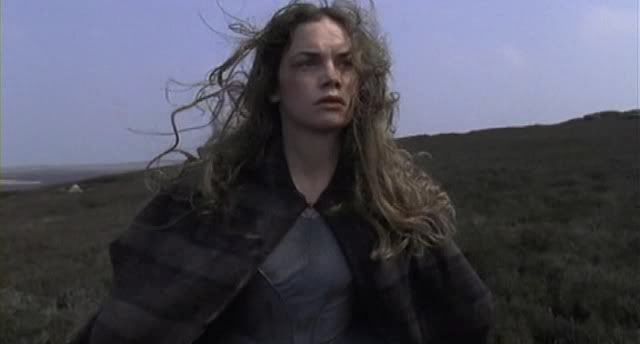When Jane Eyre leaves Thornfield with astonishing resolution, she drops the heavenly happiness behind, throws herself into an absolute unknown fate. She spends 2 days in a coach, which takes all the money she has, which drops her in middle of no where. In the following 2 days, she is nothing but a beggar - who is ready to give up her last bit of pride for a slice of bread.
This scene - 4 days' homeless and aimless life experience was briefed by almost everyone of screen adaptation, even beautified into a rather romantic scenario: exhausting Jane Eyre lies on wildness and rescued by a handsome young priest. The begging part was totally ignored. The “fact” is, Jane, a graceful, well learned governess, being completely worn out by trudging among the endless moor, finally finds a small village, where she asks jobs first, later literally begs from door to door, and is rejected from door to door. For two days, she sleeps under empty sky, eats only one small piece of bread and a “handful” pig food:
“At the door of a cottage was a little girl about to throw a meal of cold porridge into a pig trough.
‘Will you give me that?’ I asked.
She stared at me. ‘Mother!’ she exclaimed, ‘there is a woman wants to give her these porridge.’
‘Well, Iass, ‘ replied a voice within, ‘give it her if she’s a beggar. T’ pig doesn’t want it.’
The girl emptied the stiffened mould into my hand, and I devoured it ravenously. ”
In Jane's own words, those experience is "the moral degradation, blent with physical suffering..." During these two days, many times, she is driven out to the bleak lifeless moor by the coldness of villagers, many times, she is forced to go back to their cruelty by her unbearable starving stomach. Humans survive as a whole, how true! Even the proud and rebellious Jane has to go back to the people she despises to BEG for help.
I do not know if Charlotte Bronte had such dreadful experience in her own life, if not, she did have an incredible imagination, which made this 4 days experience so realistic and powerful.
I don’t quite understand what kind of harm a 18 year-old homeless girl would do to the neighborhood of this small hamlet, but literally, no one find necessity to rescue a life of young girl, and think it’s more appropriate to let her starving on lifeless moor!
The "climax" of this misery is yet to come. In the 4th night, Jane is completely worn out, and knows she either finds help, or dies. In the dusk she finds a dim light in distance, so she walks, later crawls by hands to reach the door because she has literally no energy left to standing up. After she finds through window the two young ladies inside the house lovely and kind, she thinks she finally can get help. She knocks the door, but unfortunately, again, she is rejected by the servant of the household:
"'I'm fear'd you have some ill plans agate, that bring you about folk's houses at this time o' night. If you've any followers- -housebreakers or such like--anywhere near, you may tell them we are not by ourselves in the house; we have a gentleman, and dogs, and guns.' Here the honest but inflexible servant clapped the door to and bolted it within.'
This was the climax. A pang of exquisite suffering--a throe of true despair--rent and heaved my heart. Worn out, indeed, I was; not another step could I stir. I sank on the wet doorstep: I groaned-- I wrung my hands--I wept in utter anguish. Oh, this spectre of death! Oh, this last hour, approaching in such horror! Alas, this isolation--this banishment from my kind! Not only the anchor of hope, but the footing of fortitude was gone--at least for a moment; but the last I soon endeavoured to regain.
'I can but die,' I said, 'and I believe in God. Let me try to wait His will in silence.'"
So after the door again closed, she simply lies on ground, waits for her fate to decide her life and death. It is during this “dying process”, St. John, the clergyman comes back home, find her at threshold. She is finally saved!
My heart was broken when reading all the details of the situation. I couldn't help wishing that I happened to reside in that isolated hamlet, and happened to see Jane wandering around with despair, and immediately opened door to her, offered her my foods and shelter wholeheartedly. I couldn't help to wonder why people could be so cold to a homeless young girl like Jane Eyre. However, what I can't help the most, is to wonder why this scene has never been truthfully reflect on screens? Would it look too ungraceful to Jane's character? Or is it too "negative" to display in most people's eyes?

What a thought-provoking post, Yun... the pieces you selected are beautiful too.
ReplyDeleteThis is one of the reasons why I love to read literary classics and many different kinds of books: I find what other people ignored. I find the gems that people wanted to either hide away or leave out. Why did they do it? Prejudices? Do they choose blissfully ignorant outlooks on life?
Thanks, Yun.
Welcome Julia! I too have that tendency to look for what's been left out by majority.
Delete